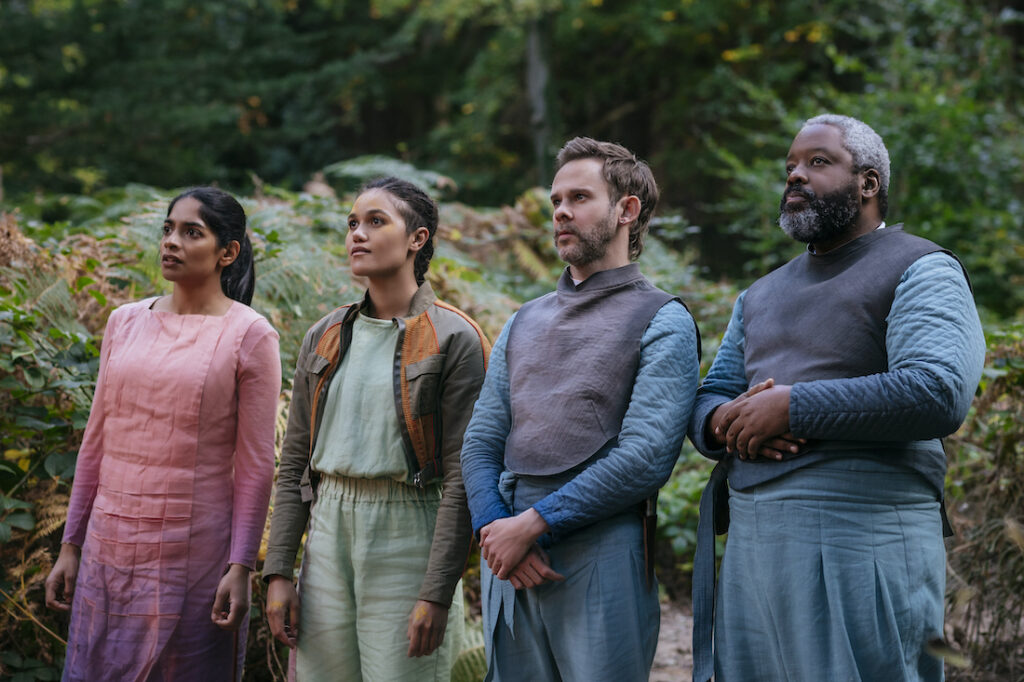“The Earth is dying,” reads the expository text crawl (isn’t there always one of those in these kinds of stories?) at the start of the six-episode first season of AMC+’s “Moonhaven.” “And its people with it.”
In response, mankind does the only sensible thing it possibly could: builds a super-advanced artificial intelligence and shoots it to the moon along with a group of first-generation moon settlers, where they’ll spend the next hundred years building a utopian society that’ll figure out how to save the Earth. Easy!
But underneath that innately silly premise (and the frequently-silly series that explores it) lies the kind of philosophical, high-concept speculative fiction we used to see all the time in the 1970s in the works of Isaac Asimov, Robert Heinlein, and Alfred Bester. How do we fix ourselves? Can something else fix us, and do we even want them to?
Before we can answer those questions, however, we’ve got a murder on the Moon. The show, created by “Lodge 49” producer Peter Ocko (that show’s creator, Jim Gavin, produces and writes some episodes), throws us in the middle of a conspiracy-laden death of a young girl on Moonhaven, the paradise that surrounds the manmade AI (here called IO) tasked with solving humanity’s problems.
The detectives on site, Paul (Dominic Monaghan) and Arlo (Kadeem Hardison) are hardly your typical police-procedural gumshoes. They’re curious, but out of their element; murders don’t happen often in their serene, cult-meets-day-spa society, which makes them all the more out of practice. Luckily, Moonhaven’s got the most advanced technology, so they don’t need to be good detectives—Paul waves a device over young Chill Shen’s (Nina-Barker Francis) body, and immediately figures out who she is and who killed her. Mystery solved!

But that mystery’s just the tip of the iceberg, one whose point crests at the arrival of Bella Sway (Emma McDonald), an Earther pilot transporting Earth envoy Indira Mare (Amara Karan) and her muscle, Tomm (Joe Manganiello, scowling under a space mohawk), to Moonhaven to prep the first wave of Mooners to return to Earth and help it heal. She bristles at the sun-dappled colony’s seeming perfection and its obnoxiously-zen occupants, all of whom walk around with the superior air that comes from being told you’re going to save the world. It’s not long, though, before she’s informed that Chill Shen is actually her biological sister she never knew, thrusting her into a mystery that goes all the way to humanity’s ultimate fate.
What feels most novel about “Moonhaven” is its uniquely bucolic tone, which fits for a sci-fi mystery from the minds behind “Lodge 49.” Like that show, this series is deeply concerned with our ongoing, futile hunt for paradise. And as such, it’s a murder mystery set in said paradise, centered around Paul and Bella as a buddy-cop duo whose primary conflict is, “She’s from the Earth, he’s from the Moon.” McDonald and Monaghan are refreshingly capable leads, feeling their fingers over the surface of paradise to find the cracks from two different directions. Bella is the skeptical Earther, flinching from a life forged in pain; Paul is a loyal acolyte to Moonhaven’s mission, even as it leads him to an “enlightened” life that makes him miserable. “I’m a bad detective,” he admits to Bella early on, but as the pair start peeling back the edges of Heaven to see the ugliness hidden beneath, those prove some of the show’s most compelling moments.
Unfortunately, “Moonhaven”’s offbeat nature is both its greatest strength and its greatest weakness. To lend to the feel that Moonhaven is an Edenic new world with its own sense of alienness, all the characters there speak with a kind of New Age gleep-glop vocabulary that’ll make you laugh as quickly as it’ll move you. Mooners speak with grave sincerity about dreadfeels and pompfluff and frightscreams; they couch heartfelt sentiment inside faux-profound statements like “It won’t be a bomb that’ll destroy us … it’ll be doubt.”
Monaghan and Hardison make this kind of enlightened naïveté work, but Mangianello, as the show’s erstwhile heavy, has particular trouble working his mouth around such mannered lines; he feels more like a frat boy who read one philosophy book and has cornered you at a bar to tell you about it. But Hardison’s a treat too, as an effervescent detective who’s thrilled that he gets to “deduce” for once. Karan and Ayelet Zurer, meanwhile, as a pair of feuding bureaucrats who disagree on whether Moonhaven owes the Earth their miracles, are mouthpieces for the show’s deeper conversations about what it means to be humanity’s saviors.

The show’s budget can also get in the way: the visual effects and production design give off the feeling of a show doing wonders with not a lot of money, impressing even as it falls short of some of its slicker sci-fi contemporaries.
There are some startling images here, from the grey moon with a blue-green oasis studded against the darkness to closeups of the show’s elegant, organic props. (The production design emulates the smooth, handcrafted feel of HBO’s gone-too-soon “Raised by Wolves,” though the latter show feels far more expensive.) But starships in flight, and some clunky computer interfaces, hardly meet the feature-quality effects of other shows of its ilk, and the forested setting can feel the product of economy as much as theme.
Yet through that chintziness and some painfully earnest world-building, there’s a lot to like about “Moonhaven”’s mission. I always prefer science fiction that takes big risks, committing to preposterous ideas (they really build a Galt’s Gulch on the Moon to figure out that, I dunno, we should probably stop polluting and end capitalism? I figured that out years ago!) and extrapolating from there.
What’s more, it allows its character to be more than mouthpieces for those ideas, fleshing them out into human beings searching for their own kind of perfection—whether or not it lay in an idyllic society of know-it-alls and “dance alphabets.”
There’s a bit of a TV sci-fi head-scratcher renaissance happening of late, with shows like “The Expanse,” “For All Mankind,” and Apple TV+’s incredibly ambitious “Foundation.” “Moonhaven” occasionally feels like the cheap, basic-cable version of those ambitious, elegantly-rendered series. But its ideas are interesting enough to make it worth the watch—you’ll just have to get past some dreadfeel dialogue filled with shadow and cringe, and discover the Truelune within yourself.
Five episodes were screened for review. The first two episodes of “Moonhaven” premiere today, July 7, with additional episodes premiering each Thursday.












